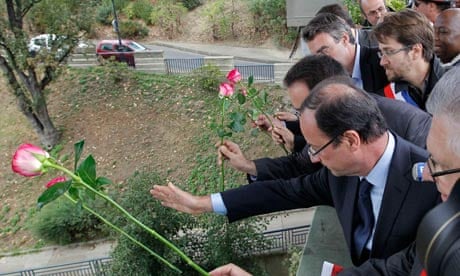Politicians, historians and protesters gathered in Paris to mark the 50th anniversary of a police crackdown on Algerian anti-war demonstrators that has become one of the most shameful episodes of modern French history.
The events of 17 October 1961 are considered a massacre by many Algerians, who claim up to 300 members of their community died at the hands of the Paris police.
Many are angry that the French government has never officially apologised for the bloody attack – which does not appear in school history books – and that the authorities still dispute the death toll.
According to officials, less than a handful of protesters died, while historians say the number of Algerians killed – some of them beaten and thrown into the river Seine – was between 50 and 120.
On Monday, François Hollande chose to mark the tragedy as his first official engagement as the newly elected Socialist party presidential candidate.
Hollande, named as the Socialists' choice to take on Nicolas Sarkozy in next year's presidential elections barely 12 hours earlier, on Monday threw a single red rose into the Seine from the bridge at Clichy, the suburb where many of the victims lived.
Afterwards he unveiled a plaque engraved with: "From this bridge and other bridges in the Paris region, Algerian demonstrators were thrown into the Seine on the 17 October 1961, victims of a blind repression. In their memory."
Benjamin Stora, a local resident and specialist in Algerian history, said it was a first step towards "recognising one of the biggest French tragedies".
Bertrand Delanoë, the mayor of Paris who was born in Tunisia, another former French colony, placed a wreath at the St Michel bridge where there is a plaque marking what his office described as a "bloody repression".
On the evening of 17 October 1961, at the height of the Franco-Algerian war, tens of thousands of Algerian protesters, including women and children, from around Paris gathered at various landmarks to demonstrate against what they considered a "racist and discriminatory" curfew imposed against them.
The mobilisation had been organised by the Paris wing of the Algerian National Liberation Front (FLN), an organisation that was fighting for Algeria's independence from France and had been accused of carrying out attacks on Paris police that left a dozen dead.
It was intended to be a peaceful demonstration, but Maurice Papon, the Paris police chief, ordered his officers to stamp out the protests. As the Algerians gathered, the police acted swiftly and brutally, firing on protesters and arresting an estimated 11,500 who were herded on to buses and taken to makeshift detention centres where many claimed they were beaten and held for days without food.
Claims that officers had beaten protesters and dumped them into the Seine appeared to be confirmed when bodies were washed up on the banks of the river.
Though nobody could have foreseen the extent of the violence, tensions between the Paris police and the city's Algerian community had been building up after the curfew was introduced in response to the police deaths.
The daily newspaper France-Soir said: "Fifty years on and a wall of silence exists around these events. The Algerians of France would today like France to recognise its responsibility."
Papon was awarded the Légion d'Honneur by President Charles de Gaulle the same year as the Algerian killings, and went on to hold a number of senior official posts.
In 1981 details emerged of his part in the deportation between 1942 and 1944 of 1,690 Jews from Bordeaux, where he was secretary of police, , but it was not until 1998 that he was convicted of crimes against humanity and stripped of his decorations and titles.
The Algerian war, which started in 1954, ended in Algeria's independence from France in 1962.
